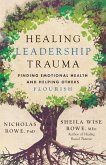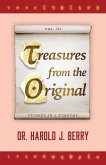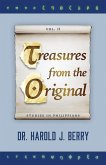Do you have trauma from what you've believed about God since childhood? (Hint: You do.) Think about it. You might not even realize it. ...It isn't just you. ...You are not alone. This book offers a page-turning look at a rarely discussed saga laced throughout the Bible from beginning to end-the story of inherited generational trauma and how it affected the impressions that the people of the Bible had about their lives and their God. The Bible tells of trauma that has been passed down to you. Some 3,000 years before the advent of modern psychology, which would identify childhood trauma as one of the primary causes of mental illness, the first authors of the Bible began to write a saga in which they collectively told the story of familial trauma, and how that trauma is passed down from parent to child over many generations. Today, this is referred to as inherited generational trauma. But, without the benefit of any knowledge of DNA or modern psychology, the biblical authors were able to observe how certain negative traits were passed down from parent to child across many generations. Of course, they didn't identify this phenomenon as being of psychological origin. They viewed this as the sins of the fathers which were passed down "upon the children unto the third and fourth generation." The first impressions of God in the Bible came primarily from two men-Abraham and Moses. This is the Abrahamic/Mosaic God described throughout the first five books of Moses-best known as the Torah. The Abrahamic/Mosaic God instilled fear in people by flooding the whole world, inflicting plagues, and otherwise expressing his anger. In fact, the Bible tells us that Moses reluctantly did what God wanted him to do because Moses was afraid of making God angry. And at one point, the Abrahamic/Mosaic God "sought to kill Moses." For better or worse, the Abrahamic/Mosaic God would set the template for how God would be perceived by more than half the world for thousands of years. Have the teachings about this God traumatized most of the world throughout history? Is the human condition filled with anger, violence, and trepidation precisely because of the widespread belief in an angry, jealous, and vengeful God? Is your life filled with depression, anxiety, and fears because of your belief in an angry and vengeful God who doesn't love you? In this book, the author proposes three things: (1) That generational trauma exists in this world largely due to the fact that over half the world's population belongs to a culture that professes belief in the trauma-inducing portrayals of, and stories about, God; (2) that the Bible authors themselves keenly observed the existence of generational trauma, which they referred to as "the sins of the fathers passed down to the third and fourth generation," providing specific examples of the effects of generational trauma; and (3) that the gospel of Jesus tackled the issue of generational trauma head on in an attempt to end its vicious cycle. These questions are discussed and explored in this book. It may contain the answers that you need. The questions and observations in this book are relevant to everyone, whether religious or not. None of us is immune to the effects of inherited generational trauma, or the fallout from whatever impressions we may have learned about God when we were children. The author offers this book in the hopes that it may be helpful to his readers, that it would provide some eye-opening answers for them in an insightful way, and that they would consider his book to be informative, entertaining, and readable.
Hinweis: Dieser Artikel kann nur an eine deutsche Lieferadresse ausgeliefert werden.
Hinweis: Dieser Artikel kann nur an eine deutsche Lieferadresse ausgeliefert werden.








